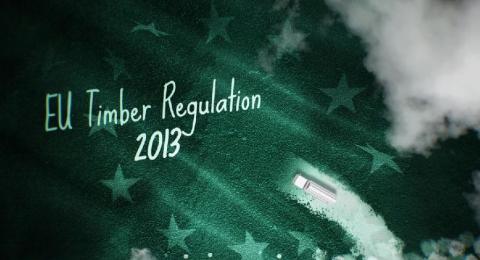Illegal overseas, now illegal here: levelling the field for the timber industry
3 March 2013, London: As of today, it is illegal for companies to place illegal timber on the EU market as the EU Timber Regulation comes into force. Non-profit organisation NEPCon welcomes the landmark legislation and anticipates it will make – rather than break – the European industries.
“The importance of the EU Timber Regulation cannot be overstated. This rigorous and targeted legislation is a major step forward in tackling one of the most heinous international crimes in existence today – illegal logging”, comments NEPCon’s Executive Director Peter Feilberg. This legislative change is anticipated to cause a ripple effect across the global timber trade.
Effective on 3 March 2013 across all EU member states - including the UK and Ireland – the EU Timber Regulation bans products containing illegal timber from being placed on the EU market. The regulation requires European companies trading in a wide range of timber and paper products to have a comprehensive due diligence system in place to minimise the risk of illegal material entering their supply chains.
Mafia methods create unfair competition
According to authorities such as the World Bank, INTERPOL and the United Nations Environment Programme (UNEP), illegal logging is big business, worth minimum 10-15 billion USD per year. Unscrupulous white-collar mafias and criminals are often behind illegal harvesting operations and related cover-up scams.
Far removed from the scene of crime, they skim the cream of illicit trans-boundary transactions and unlawful deforestation which contribute to climate change, cause untold tragedy for local people and wildlife, and defraud less economically developed countries of badly needed taxes and fees. Illegal timber remains a widespread commodity competing with legal timber products on an unfair basis.
The EU is a key destination for both legal and illegal timber. According to a recent report, just four key markets – the EU, the US, China and Japan – consume over 80 per cent of the world’s illegal timber exports.
“Considering the size of the EU market and the detailed operational requirements of the EU Timber Regulation, the regulation is bound to significantly impact the way timber products are traded globally. This may be the most important piece of forestry related legislation ever adopted anywhere in the world”, says Mr Feilberg.
Bureaucracy or opportunity?
A key question is how the regulation will affect the European industry: will the requirements make sourcing of some products virtually impossible? Will we see businesses foldue to supply problems? Will timber prices go up, allowing competing materials to replace wood?
“The EU Timber Regulation is challenging for business because it is a profound initiative with a massive potential for causing real change”, comments Mr Feilberg. “Change is clearly needed and the issue is not if, but how those challenges can be tackled. Along with similar legal frameworks in the US and Australia, the EU regulation is already fostering innovative approaches. We are seeing industries, NGOs, certification schemes, trade organisations and government bodies actively participate in finding solutions that work for the industry”.
“Supplier markets, especially in high risk countries, are also responding to the situation in anticipation of increased demands for legality assurance. We are seeing a surge in FSC certification in such markets”.
Mr Feilberg also points out that the regulation creates a push towards enhanced supply chain management, which is more than likely to prove an advantage in a world of growing natural resource scarcity. “Buyers increasingly need to know where their timber products are coming from in order to ensure stable supplies in the future”, he says.
Will SMEs be left behind?
The regulation is of particular concern for small and medium enterprises (SMEs), which may lack the resources to deal effectively with the new requirements. EU companies risk legal persecution if they are found to be in breach of the regulation; non-EU companies may find the gates of the EU markets closed unless they are able to produce the right types of documentation.
“There is clearly a great need for support initiatives enabling SMEs to jump on the bandwagon”, says Mr Feilberg, “With adequate guidance and tools, they will be able to thrive on the new market. While some solutions exist, other solutions will emerge and evolve to become more advanced and efficient over time.
I sincerely believe that the EU Timber Regulation will turn out to be a strong force in turning the tides in favour of our forests”.
Contact:
Peter Feilberg NEPCon Executive Director Email |+372 5664 0246
Christian Sloth NEPCon Forest Legality Programme Manager Email |+45 3158 7981
About NEPCon
NEPCon is an international, non-profit organisation that promotes the responsible use of natural resources through sustainability services and innovation projects. NEPCon collaborates with other organisations on assisting companies in meeting the new requirement and ensure they are not trading illegal harvested material. Learn more about NEPCon at www.nepcon.net.
About Peter Feilberg
As Executive Director, Mr Feilberg provides leadership of NEPCon with visionary thinking, drawing on more than fifteen years of active involvement in developing the global forest certification world. His experience and thought-leadership has positioned him as a respected voice within the forest and wood industry certification arena. He is a frequent speaker at global sustainability events.



